Related Research Articles

Carmarthen East and Dinefwr was a constituency of the House of Commons of the Parliament of the United Kingdom last represented since 2010 by Jonathan Edwards of Plaid Cymru. It elected one Member of Parliament (MP) by the first past the post system of election. It was created in 1997, mostly from the former seat of Carmarthen.

Carmarthenshire County Council is the local authority for the county of Carmarthenshire, Wales. It provides a range of services including education, planning, transport, social services and public safety. The council is one of twenty-two unitary authorities that came into existence on 1 April 1996 under the provisions of the Local Government (Wales) Act 1994. It took over local government functions previously provided by the three district councils of Carmarthen, Dinefwr, and Llanelli, as well as the county-level services in the area from Dyfed County Council, all of which councils were abolished at the same time.
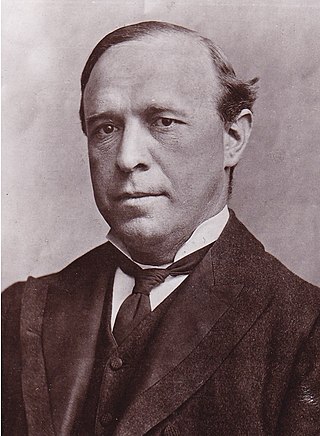
William Llewelyn Williams known as Llewelyn Williams, was a Welsh journalist, lawyer and radical Liberal Party politician.
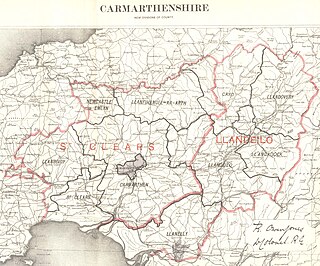
East Carmarthenshire was a county constituency in Carmarthenshire, Wales. It returned one Member of Parliament (MP) to the House of Commons of the Parliament of the United Kingdom, elected by the first past the post voting system.

West Carmarthenshire was a parliamentary constituency in Wales which returned one Member of Parliament (MP) to the House of Commons of the Parliament of the United Kingdom.
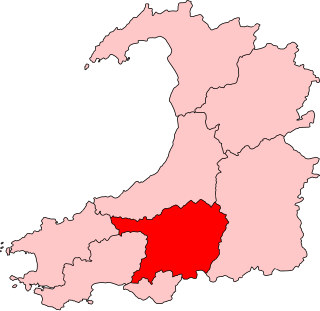
Carmarthen East and Dinefwr is a constituency of the Senedd. It elects one Member of the Senedd by the first past the post method of election. It is one of eight constituencies in the Mid and West Wales electoral region, which elects four additional members, in addition to eight constituency members, to produce a degree of proportional representation for the region as a whole.
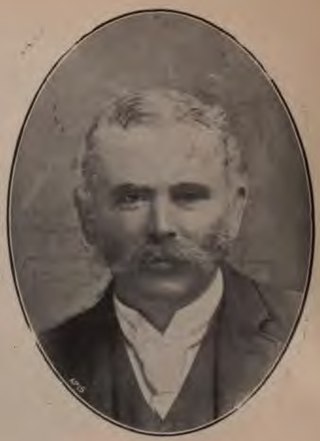
Abel Thomas was a Welsh Liberal politician and lawyer.
David Pugh was a Welsh landowner and Liberal Party politician who sat in the House of Commons from 1857 until 1868 and again from 1885 until his death in 1890.

Walter Rice Howell Powell was a Welsh landowner and Liberal politician. He was Member of Parliament for Carmarthenshire from 1880 until 1885 and for West Carmarthenshire from 1885 until his death in 1889.

John Lloyd Morgan was Liberal Party Member of Parliament (MP) for West Carmarthenshire from 1889 to 1910, and a County Court judge.
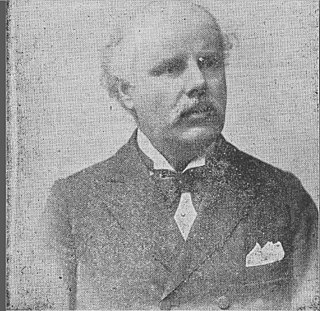
Alfred Davies, was a British Liberal Party politician and businessman. Davies founded the British freight forwarding company Davies Turner in 1870 which claimed in 2013 to be the largest independent freight forwarding company operating in Great Britain.

Sir Daniel Lleufer Thomas was a Welsh magistrate, social reformer, and writer.

Robert John Dickson Burnie was a Liberal politician who served as MP for the Swansea Town constituency from 1892 to 1895. He was regarded as being on the radical wing of the party and was popular with working-class electors. Defeated by Sir John Llewelyn in 1895 he was rejected as a candidate for the constituency in 1900 due to his opposition to the South African War.
The first election to the Carmarthenshire County Council was held in January 1889. It was followed by the 1892 election.
The second election to the Carmarthenshire County Council was held in March 1892. It was preceded by the 1889 election and followed by the 1895 election.
The third election to the Carmarthenshire County Council was held in March 1895. It was preceded by the 1892 election and followed by the 1898 election.
The sixth election to the Carmarthenshire County Council was held in March 1904. It was preceded by the 1901 election and followed by the 1907 election.
The ninth election to the Carmarthenshire County Council was held in March 1913. It was preceded by the 1910 election and followed, due to the First World War and the postponement of the 1916 elections, by the 1919 election.
An election to the Carmarthenshire County Council was held in March 1946. The 1940 and 1943 elections were postponed due to the Second World War, therefore the election was preceded by the 1937 election and followed, by the 1949 election.
An election to the Carmarthenshire County Council was held in March 1919. It was preceded by the 1913 election and followed by the 1922 election.
References
- ↑ "East Carmarthenshire". Carmarthen Journal. 27 June 1890. p. 5. Retrieved 4 December 2016.
- 1 2 3 "The Vacancy in East Carmarthenshire. Meeting of the Radical Executive Committee". Carmarthen Journal. 25 July 1890. p. 3. Retrieved 3 December 2016.
- 1 2 3 4 "Meeting at Llandilo [sic]". Carmarthen Journal. 25 July 1890. p. 3. Retrieved 8 December 2016.
- 1 2 3 "Meeting at Llandovery". Carmarthen Journal. 25 July 1890. p. 3. Retrieved 9 December 2016.
- ↑ "The Vacancy in East Carmarthenshire". Carmarthen Journal. 1 August 1890. p. 8. Retrieved 9 December 2016.
- ↑ "Mr Abel Thomas". Editorial. Cambrian News. 1 August 1890. p. 5. Retrieved 10 December 2016.
- ↑ "Editorial". Carmarthen Journal. 8 August 1890. p. 5. Retrieved 9 December 2016.
- ↑ "The Vacancy in East Carmarthenshire. Unopposed Return of Mr Abel Thomas". Carmarthen Journal. 15 August 1890. p. 2. Retrieved 9 December 2016.
- ↑ Craig, F. W. S. (1974). British parliamentary election results 1885-1918 (1 ed.). London and Basingstoke: The Macmillan Press Ltd. ISBN 9780333169032. Page 472